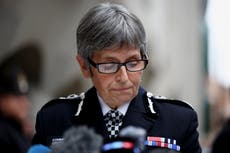Sarah Everard: Police forces to review allegations of sex offences and domestic abuse involving serving officers
Review by chief constables will include claims of indecent exposure after failure to arrest Wayne Couzens

All police forces in England and Wales are to review allegations of indecent exposure, sex offences and violence against women by serving officers.
The announcement comes after the rape and murder of Sarah Everard, by Metropolitan Police constable Wayne Couzens, raised questions about the vetting and monitoring of police officers.
A watchdog is investigating why Couzens was not arrested over two indecent exposure incidents, and a public inquiry will look at how he was able to remain a police officer despite reportedly being nicknamed “the rapist” by colleagues.
The National Police Chiefs Council (NPCC) said all forces had been asked to review any reports of incidents relating to violence against women and girls, including indecent exposure, involving serving police officers or staff.
The NPCC has suggested that cases from the past two years at least are looked at again, as well as all current investigations into allegations of sexual misconduct and domestic abuse.
Forces will “dip-sample” cases from the last 10 years where sexual misconduct and domestic abuse allegations have been made, and where those accused remain in service, to ensure that appropriate measures, including vetting reviews, have been undertaken.
Chief constables will seek to ensure that information is shared between a force in whose region an offence is committed and the force in which the officer works.
They will also be checking that vetting procedures are being followed, having conversations about “values and standards”, and assessing their force’s response to violence against women.
The action plan was set up at an NPCC meeting involving chief constables from forces in England and Wales last week.
NPCC chair Martin Hewitt told reporters: “We need to know precisely what has gone on, what is going on, and any action that needs to be taken in any of those cases.”
He said police leaders were doing “everything that we can do to ensure that the way we deal with violence against women and girls is as effective and as assertive as it can be”.
Reiterating the “betrayal” and disgust felt at the actions of Couzens, Mr Hewitt said he had a “sense of the determination” among chief constables to rebuild public trust.

“There are things that we can do, there are things that we know we need to do, we absolutely have to be listening,” he added.
While the work is being coordinated by the NPCC, forces will conduct the individual reviews internally. No timeframe has yet been set for carrying out the checks, and it is unclear whether the findings will be made public.
The Metropolitan Police announced its own review of sex offence and domestic abuse cases involving serving officers and staff on Friday, and admitted that some accused officers had been permitted to remain in service.
A separate public inquiry was announced by Priti Patel last week, which will look at how Couzens was allowed to remain in the police as well as “wider issues” raised by the case.
The national police watchdog is already running several investigations sparked by the murder, including into material shared in a WhatsApp group involving Couzens.
The Independent Office for Police Conduct is also investigating why Couzens was not arrested over two indecent exposure incidents – one in 2015, and the other just days before Ms Everard’s murder.



Bookmark popover
Removed from bookmarks